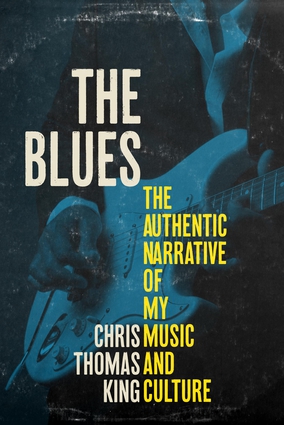Overview
An untold authentic counter-narrative blues history and the first written by an African American blues artist
"A fresh new perspective that will be a true revolution to readers and will open new lines of discussion on . . . the importance of the city of New Orleans for generations to come." —Dr. Michael White, jazz clarinetist, composer, and Keller Endowed Chair at Xavier University of LA
An untold authentic counter-narrative blues history and the first written by an African American blues artist
All prior histories on the blues have alleged it originated on plantations in the Mississippi Delta. Not true, says author Chris Thomas King. In The Blues, King present facts to disprove such myths.
This book is the first to argue the blues began as a cosmopolitan art form, not a rural one.
As early as 1900, the sound of the blues was ubiquitous in New Orleans. The Mississippi Delta, meanwhile, was an unpopulated sportsman’s paradise—the frontier was still in the process of being cleared and drained for cultivation.
Expecting these findings to be controversial in some circles, King has buttressed his conclusions with primary sources and years of extensive research, including a sojourn to West Africa and interviews with surviving folklorists and blues researchers from the 1960s folk-rediscovery epoch.
New Orleans, King states, was the only place in the Deep South where the sacred and profane could party together without fear of persecution, creating the blues.
Reviews
"Chris Thomas King has crafted a timely and insightful work expounding upon history, music, social issues, and his own life's experiences. Most important, his revision of blues history and revolutionary new theory concerning the origins, meaning, and nature of blues is a fresh new perspective that will be a true revolution to readers and will open new lines of discussion on American culture and the importance of the city of New Orleans for generations to come." —Dr. Michael White, jazz clarinetist, composer, and Keller Endowed Chair at Xavier University of LA
"In his book
The Blues, Chris Thomas King, musician, author, and disciple, emerges as the newly minted messiah: an enlightened prophet, rising from the misunderstood, misinformed, and mis-gathered ashes of America's blues legacy like a phoenix steeped in the word—the gospel testament that is the authentic verse, chapter, and psalm, as is his birthright and legacy, the history he has lived and been gifted. His tireless research, driven by a need to uncover the essence of his art and heritage, lead him to unearth and expand the true narrative of the blues and set the record straight for posterity." —
Alexander Smalls, author of Meals, Music, and Muses and Grace the Table“A passionate narrative that will attract attention, debate, and ruffled feathers.” —
Kirkus Reviews“A total game changer…[a] groundbreaking major contribution to blues literature.” —
Living BluesAuthor Biography
Chris Thomas King, born into the blues in 1962, was discovered in Louisiana in 1979 by a folklorist from the Smithsonian Institute and introduced to the world by folk label Arhoolie Records as an authentic folk-blues successor to Huddie “Leadbelly” Ledbetter, Muddy Waters, Robert Johnson, and Jelly Roll Morton. King played the itinerant bluesman Tommy Johnson in the movie O Brother Where Art Thou, and he has earned numerous awards, including an Album of the Year Grammy and an Album of the Year Country Music (CMA) Award. King has inspired a new generation of musicians such as Hozier, Mumford & Sons, and Gary Clark Jr., and his songs “Hard Time Killing Floor Blues” and “John Law Burned Down the Liquor Sto',” among others, have been covered by many artists including blues legend Buddy Guy.
 Mother's Day
Mother's Day Father's Day
Father's Day
